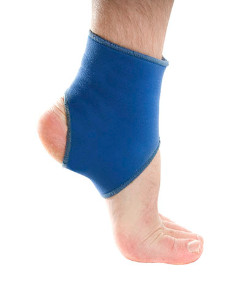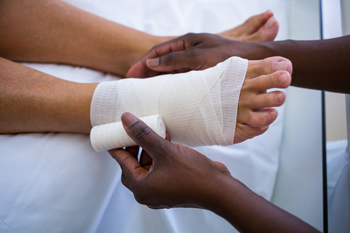 An injury that has damaged the ligaments of the ankle is often referred to as an ankle sprain. If the ligaments completely tear, the sprain is said to be severe, and can produce extreme pain and discomfort. If the ligaments become irritated, you may have endured a mild ankle sprain, and this may happen as a result of overstretching. Once the injury has occurred, a proper diagnosis is typically performed, which can be helpful in ruling out a broken ankle. Many patients find it beneficial to wrap the affected ankle in an elastic bandage, as this aids in providing necessary support as the healing process occurs. If you feel you have sprained your ankle, please consult with a podiatrist as quickly as possible so they can effectively treat this condition.
An injury that has damaged the ligaments of the ankle is often referred to as an ankle sprain. If the ligaments completely tear, the sprain is said to be severe, and can produce extreme pain and discomfort. If the ligaments become irritated, you may have endured a mild ankle sprain, and this may happen as a result of overstretching. Once the injury has occurred, a proper diagnosis is typically performed, which can be helpful in ruling out a broken ankle. Many patients find it beneficial to wrap the affected ankle in an elastic bandage, as this aids in providing necessary support as the healing process occurs. If you feel you have sprained your ankle, please consult with a podiatrist as quickly as possible so they can effectively treat this condition.
Although ankle sprains are common, they aren’t always minor injuries. If you need your ankle injury looked at, contact one of our podiatrists from Foot Health Center of Merrimack Valley. Our doctors can provide the care you need to keep you pain-free and on your feet.
How Does an Ankle Sprain Occur?
Ankle sprains are the result of a tear in the ligaments within the ankle. These injuries may happen when you make a rapid shifting movement while your foot is planted. A less common way to sprain your ankle is when your ankle rolls inward while your foot turns outward.
What Are the Symptoms?
- Pain at the sight of the tear
- Bruising/Swelling
- Ankle area is tender to touch
- In severe cases, may hear/feel something tear
- Skin discoloration
Preventing a Sprain
- Wearing appropriate shoes for the occasion
- Stretching before exercises and sports
- Knowing your limits
Treatment of a Sprain
In many cases, the RICE method (Rest, Ice, Compression, and Elevate) is used to treat ankle sprains. However, you should see a podiatrist to see which treatment option would work best with your injury. In severe cases, surgery may be required.
It is important to ask your doctor about rehab options after you receive treatment for your injury. Stretching, strength training, and balance exercises may help the ankle heal while also preventing further injury.
If you have any questions, please feel free to contact one of our offices located in North Andover, and Tewksbury, MA . We offer the newest diagnostic and treatment technologies for all your foot care needs.











